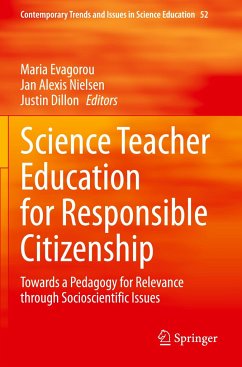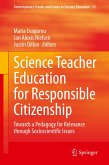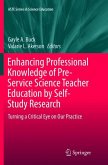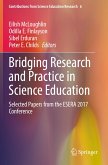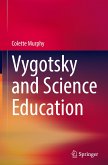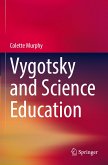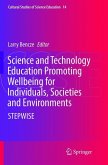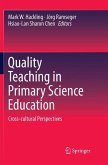Science Teacher Education for Responsible Citizenship
Towards a Pedagogy for Relevance through Socioscientific Issues
Herausgegeben:Evagorou, Maria; Nielsen, Jan Alexis; Dillon, Justin
Science Teacher Education for Responsible Citizenship
Towards a Pedagogy for Relevance through Socioscientific Issues
Herausgegeben:Evagorou, Maria; Nielsen, Jan Alexis; Dillon, Justin
- Broschiertes Buch
- Merkliste
- Auf die Merkliste
- Bewerten Bewerten
- Teilen
- Produkt teilen
- Produkterinnerung
- Produkterinnerung
This edited book aims to provide a global perspective on socioscientific issues (SSI), responsible citizenship and the relevance of science, with an emphasis on science teacher education. The volume, with more than twenty-five contributors from Africa, North and South America, Asia, Australasia and Europe, focuses on examples from in- and pre-service teacher training. The contributors expand on issues related to teachers' beliefs about teaching SSI, teachers' challenges when designing and implementing SSI-related activities, the role of professional development, both in pre- and in-service…mehr
Andere Kunden interessierten sich auch für
![Science Teacher Education for Responsible Citizenship Science Teacher Education for Responsible Citizenship]() Science Teacher Education for Responsible Citizenship104,99 €
Science Teacher Education for Responsible Citizenship104,99 €![Enhancing Professional Knowledge of Pre-Service Science Teacher Education by Self-Study Research Enhancing Professional Knowledge of Pre-Service Science Teacher Education by Self-Study Research]() Enhancing Professional Knowledge of Pre-Service Science Teacher Education by Self-Study Research75,99 €
Enhancing Professional Knowledge of Pre-Service Science Teacher Education by Self-Study Research75,99 €![Bridging Research and Practice in Science Education Bridging Research and Practice in Science Education]() Bridging Research and Practice in Science Education75,99 €
Bridging Research and Practice in Science Education75,99 €![Vygotsky and Science Education Vygotsky and Science Education]() Colette MurphyVygotsky and Science Education104,99 €
Colette MurphyVygotsky and Science Education104,99 €![Vygotsky and Science Education Vygotsky and Science Education]() Colette MurphyVygotsky and Science Education104,99 €
Colette MurphyVygotsky and Science Education104,99 €![Science and Technology Education Promoting Wellbeing for Individuals, Societies and Environments Science and Technology Education Promoting Wellbeing for Individuals, Societies and Environments]() Science and Technology Education Promoting Wellbeing for Individuals, Societies and Environments106,99 €
Science and Technology Education Promoting Wellbeing for Individuals, Societies and Environments106,99 €![Quality Teaching in Primary Science Education Quality Teaching in Primary Science Education]() Quality Teaching in Primary Science Education90,99 €
Quality Teaching in Primary Science Education90,99 €-
-
-
This edited book aims to provide a global perspective on socioscientific issues (SSI), responsible citizenship and the relevance of science, with an emphasis on science teacher education. The volume, with more than twenty-five contributors from Africa, North and South America, Asia, Australasia and Europe, focuses on examples from in- and pre-service teacher training. The contributors expand on issues related to teachers' beliefs about teaching SSI, teachers' challenges when designing and implementing SSI-related activities, the role of professional development, both in pre- and in-service teacher training, in promoting SSI, the role of the nature of science when teaching SSI, promoting scientific practices through SSI in pre-service teaching, and the role of indigenous knowledge in SSI teaching. Finally, the book discusses new perspectives for addressing SSI in teacher education through the lens of relevance and responsible citizenship.
Produktdetails
- Produktdetails
- Contemporary Trends and Issues in Science Education 52
- Verlag: Springer / Springer International Publishing / Springer, Berlin
- Artikelnr. des Verlages: 978-3-030-40231-0
- 1st edition 2020
- Seitenzahl: 216
- Erscheinungstermin: 24. März 2021
- Englisch
- Abmessung: 235mm x 155mm x 12mm
- Gewicht: 335g
- ISBN-13: 9783030402310
- ISBN-10: 3030402312
- Artikelnr.: 61239435
- Herstellerkennzeichnung Die Herstellerinformationen sind derzeit nicht verfügbar.
- Contemporary Trends and Issues in Science Education 52
- Verlag: Springer / Springer International Publishing / Springer, Berlin
- Artikelnr. des Verlages: 978-3-030-40231-0
- 1st edition 2020
- Seitenzahl: 216
- Erscheinungstermin: 24. März 2021
- Englisch
- Abmessung: 235mm x 155mm x 12mm
- Gewicht: 335g
- ISBN-13: 9783030402310
- ISBN-10: 3030402312
- Artikelnr.: 61239435
- Herstellerkennzeichnung Die Herstellerinformationen sind derzeit nicht verfügbar.
Maria Evagorou is an Associate Professor at the University of Nicosia, Cyprus. Her scholarly activity focuses on exploring and enhancing young students' and pre-service teachers' argumentation skills within socioscientific issues. More specifically, the emphasis of her work is on students' and teachers' talk when they engage in the discussion of SSI and aims to explore ways in which teachers can be supported in their effort to include SSI in their teaching s. She has worked as a principal investigator and senior researcher on various EU and local research projects, served as a member on the JRST editorial board, and as a strand coordinator for ESERA, and has published widely. Jan Alexis Nielsen is Associate Professor at the Department of Science Education at the University of Copenhagen, Denmark. His research focuses on the understanding and assessment of generic competences. He has investigated students' socioscientific argumentation and teachers' beliefs about teaching socioscientific issues. He has also worked closely with teachers to build assessment frameworks for inquiry, modelling and innovation competence. Over the past 12 years, he has participated in a range of international and national projects related to inquiry and/or socioscientific issues. Justin Dillon is professor of science and environmental education at the University of Exeter. After studying for a degree in chemistry, he trained as a science teacher at Chelsea College and taught in six inner London schools. Justin joined King's College London in 1989 and was promoted to professor in 2009. He is editor-in-chief of Studies in Science Education and co-edits the International Journal of Science Education. In 2007, Justin was elected President of the European Science Education Research Association. He has co-edited 18 books including Becoming a Teacher, Bad Education and the International Handbook of Research onEnvironmental Education. Justin has published around 100 papers in peer-reviewed journals and almost the same number of book chapters.
Chapter 1. Introduction: Socio-scientific issues as promoting responsible citizenship and the relevance of science (Maria Evagorou and Justin Dillon).- Chapter 2. Teachers and Socioscientific Issues - An Overview of Recent Empirical Research (Jan Alexis Nielsen).- Chapter 3. Pre-service secondary science teachers' beliefs about teaching socio-scientific issues (Jessica S. C. Leung, Ka Lok Wong, and Kennedy K. H. Chan).- Chapter 4. Socio-scientific inquiry-based learning: possibilities and challenges for teacher education (Ruth Amos, Marie-Christine Knippels and Ralph Levinson).- Chapter 5. Critical and Active Public Engagement in Addressing Socioscientific Problems Through Science Teacher Education (Larry Bencze, Sarah El Halwany and Majd Zouda).- Chapter 6. Supporting Teachers in the Design and Enactment of Socio-Scientific Issue Based Teaching in the USA (Patricia J. Friedrichsen, Troy D. Sadler and Laura Zangori).- Chapter 7. Gamification of SSI's as a Science Pedagogy: Toward aCritical Rationality in Teaching Science (James P. Davis and Alberto Bellocchi).- Chapter 8. Science teachers as proponents of socio-scientific inquiry-based learning: From professional development to classroom enactment (Rachel Cohen, Eran Zafrani and Anat Yarden).- Chapter 9. Getting ready to work with socio-scientific issues in the classroom: a study with Argentine teachers (Melina Furman, Inés Taylor, Mariana Luzuriaga and María Eugenia Podestá).- Chapter 10. Introducing SSI in primary pre-service teacher education: scientific practices to learn the 'big ideas' of science (Anna Garrido Espeja and Digna Couso).- Chapter 11. Re-thinking the Integration of Socioscientific Issues in Teacher Education (Ronicka Mudaly).- Chapter 12. New Perspectives for Addressing Socioscientific Issues in Teacher Education (Jan Alexis Nielsen, Maria Evagorou and Justin Dillon).
Chapter 1. Introduction: Socio-scientific issues as promoting responsible citizenship and the relevance of science (Maria Evagorou and Justin Dillon).- Chapter 2. Teachers and Socioscientific Issues - An Overview of Recent Empirical Research (Jan Alexis Nielsen).- Chapter 3. Pre-service secondary science teachers' beliefs about teaching socio-scientific issues (Jessica S. C. Leung, Ka Lok Wong, and Kennedy K. H. Chan).- Chapter 4. Socio-scientific inquiry-based learning: possibilities and challenges for teacher education (Ruth Amos, Marie-Christine Knippels and Ralph Levinson).- Chapter 5. Critical and Active Public Engagement in Addressing Socioscientific Problems Through Science Teacher Education (Larry Bencze, Sarah El Halwany and Majd Zouda).- Chapter 6. Supporting Teachers in the Design and Enactment of Socio-Scientific Issue Based Teaching in the USA (Patricia J. Friedrichsen, Troy D. Sadler and Laura Zangori).- Chapter 7. Gamification of SSI's as a Science Pedagogy: Toward aCritical Rationality in Teaching Science (James P. Davis and Alberto Bellocchi).- Chapter 8. Science teachers as proponents of socio-scientific inquiry-based learning: From professional development to classroom enactment (Rachel Cohen, Eran Zafrani and Anat Yarden).- Chapter 9. Getting ready to work with socio-scientific issues in the classroom: a study with Argentine teachers (Melina Furman, Inés Taylor, Mariana Luzuriaga and María Eugenia Podestá).- Chapter 10. Introducing SSI in primary pre-service teacher education: scientific practices to learn the 'big ideas' of science (Anna Garrido Espeja and Digna Couso).- Chapter 11. Re-thinking the Integration of Socioscientific Issues in Teacher Education (Ronicka Mudaly).- Chapter 12. New Perspectives for Addressing Socioscientific Issues in Teacher Education (Jan Alexis Nielsen, Maria Evagorou and Justin Dillon).

